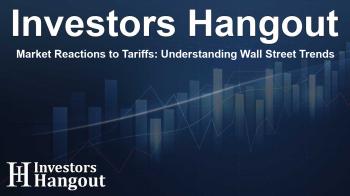Market Reactions to Tariffs: Understanding Wall Street Trends

Investor Concerns About Tariffs
As President Donald Trump sticks to his deadline for imposing heavy tariffs, many investors seem unfazed. The impending tariffs have elicited curious responses from those observing market trends. Questions arise about whether traders on Wall Street care about the economic implications of these tariffs or are they growing numb to such declarations.
Market Stability Despite Tariff Threats
Recent fluctuations in Wall Street reveal a slight dip; however, the overall market resilience is notable. For instance, the Dow saw a fall of 0.4%, while the S&P 500 reduced by a mere 0.07%. In contrast, the Nasdaq showed minimal gains. This pattern persisted despite Trump's firm statements regarding increased tariffs, which are set for an imminent rollout.
Understanding Investor Sentiment
Investor sentiment today appears to differ significantly from earlier reactions to Trump's tariff announcements. Historically, such announcements prompted immediate panic and aggressive market responses. Yet, today, there’s a sense of disbelief among investors who now tend not to react as strongly to tariff threats. This skepticism is exemplified by comments online, suggesting that past experiences may have conditioned them to disregard Trump’s tariff threats.
Tariff Complacency on Wall Street
The general consensus among investors seems to weigh towards skepticism regarding the actual repercussions that heavy tariffs may bring. Many believe Trump’s announcements often lack the intensity they initially suggest, which leads to complacency in the market. A Reddit user succinctly captured the mood by stating that traders have grown accustomed to the repetitive nature of such tariffs.
Price Adjustments and Market Predictions
Despite the heavy rhetoric surrounding tariffs, many analysts assert that markets have already accounted for the associated risks. For example, when initial threats emerged, the market reacted ferociously. Today, current tariff expectations align with what traders have viewed as manageable adjustments. Even new announcements regarding tariffs on copper and pharmaceuticals have not deterred market confidence.
Short-term Gains Amid Long-term Concerns
Interestingly, while the tariff announcements may not shake market confidence presently, some experts caution that the long-term effects could be significant. Analysts warn observers to expect potential disruptions as companies may eventually pass increased costs onto consumers. As a result, although some stocks initially soared, questions linger regarding the sustainability of such gains under tariff pressures.
Looking Ahead: The Importance of Federal Policies
Currently, investors appear more focused on the actions of the Federal Reserve and ongoing earnings reports than solely on impending tariffs. This shift indicates a broader engagement with macroeconomic policies that could influence market performance. As one insightful investor noted, "The stock market isn't synonymous with the economy." This statement captures a prevailing sentiment that often gets overlooked in light of tariff announcements.
Ending Thoughts on Market Confidence
In summary, as traders navigate through the complexities of reported tariffs, many are learning to adopt a measured approach rather than reacting with panic. Factors like the Federal Reserve's approach and Q2 earnings reports are proving more relevant in affecting market movements. Investors are encouraged to remain observant and prepared as conditions may evolve rapidly under changing economic landscapes.
Frequently Asked Questions
What are Trump’s upcoming tariffs about?
Trump's tariffs focus on various sectors, including metals and pharmaceuticals, aimed at addressing trade balance issues.
Why is Wall Street indifferent to tariff threats?
Investor skepticism toward Trump's tariff threats has grown due to previous instances where strong rhetoric didn't materialize into severe market consequences.
How do tariffs impact the economy?
Tariffs can lead to increased consumer prices while affecting the supply chain dynamics in various industries.
What should investors focus on today?
Investors are advised to monitor Federal Reserve policies and earnings reports for deeper insights rather than getting caught up in tariff headlines.
How might tariffs affect stocks long-term?
While short-term impacts might appear mild, long-term effects like passed costs could alter profitability metrics for many companies.
About The Author
Contact Dominic Sanders privately here. Or send an email with ATTN: Dominic Sanders as the subject to contact@investorshangout.com.
About Investors Hangout
Investors Hangout is a leading online stock forum for financial discussion and learning, offering a wide range of free tools and resources. It draws in traders of all levels, who exchange market knowledge, investigate trading tactics, and keep an eye on industry developments in real time. Featuring financial articles, stock message boards, quotes, charts, company profiles, and live news updates. Through cooperative learning and a wealth of informational resources, it helps users from novices creating their first portfolios to experts honing their techniques. Join Investors Hangout today: https://investorshangout.com/
The content of this article is based on factual, publicly available information and does not represent legal, financial, or investment advice. Investors Hangout does not offer financial advice, and the author is not a licensed financial advisor. Consult a qualified advisor before making any financial or investment decisions based on this article. This article should not be considered advice to purchase, sell, or hold any securities or other investments. If any of the material provided here is inaccurate, please contact us for corrections.

